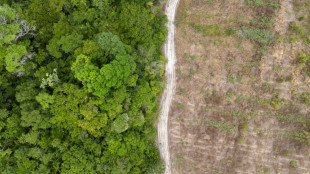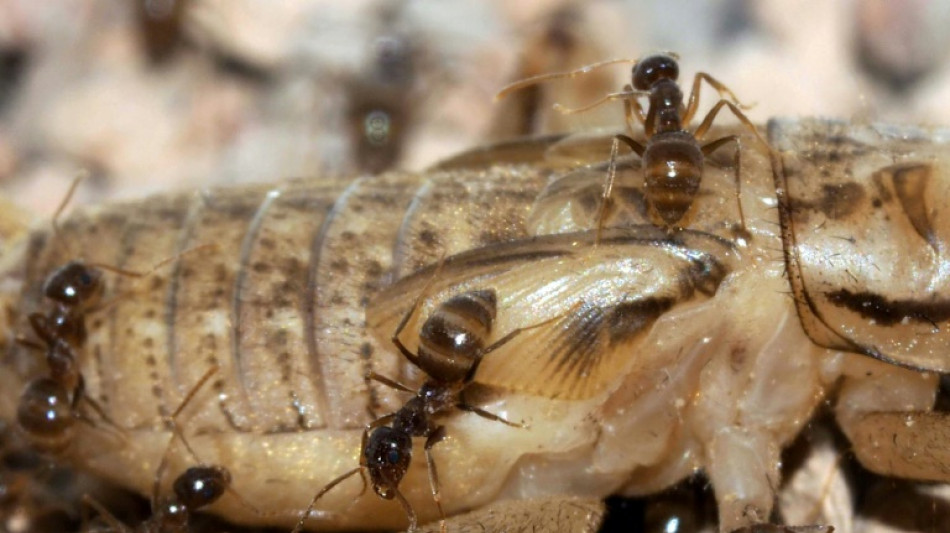
-
 Trump stirs global tensions, confusion with nuclear test order
Trump stirs global tensions, confusion with nuclear test order
-
Panic across US as health insurance costs set to surge

-
 Court eases ban on Russian lugers but Olympic hopes on thin ice
Court eases ban on Russian lugers but Olympic hopes on thin ice
-
England captain Itoje targets Autumn Nations clean sweep

-
 Calmer Sabalenka sets sights on WTA Finals crown
Calmer Sabalenka sets sights on WTA Finals crown
-
Spurs boosted by Romero return for Chelsea clash

-
 Sudan's RSF claims arrests as UN warns of 'horrendous' atrocities in Darfur
Sudan's RSF claims arrests as UN warns of 'horrendous' atrocities in Darfur
-
US says 'non-market' tactics needed to counter China's rare earth dominance

-
 China sends youngest astronaut, mice to space station
China sends youngest astronaut, mice to space station
-
From adored prince to outcast, Andrew's years-long fall from grace

-
 Rodri return fuels Guardiola belief in Man City title challenge
Rodri return fuels Guardiola belief in Man City title challenge
-
China holds send-off ceremony for space station astronauts

-
 Barcelona to show off unfinished Camp Nou with public training session
Barcelona to show off unfinished Camp Nou with public training session
-
Turkish court jails 11 for life over deadly hotel inferno

-
 Auger-Aliassime ends Vacherot run to reach Paris Masters semis
Auger-Aliassime ends Vacherot run to reach Paris Masters semis
-
Australia captain Wilson denies Wallabies use 'dangerous' breakdown tactics

-
 'Populists can be beaten': Dutch centrist Jetten claims election win
'Populists can be beaten': Dutch centrist Jetten claims election win
-
China's suspension of rare earth controls applies to EU: official

-
 Italy complains about strong euro, urges ECB to cut rates
Italy complains about strong euro, urges ECB to cut rates
-
Louvre to get anti-ramming barriers by year end: minister

-
 Wall Street bounces on Amazon, Apple earnings
Wall Street bounces on Amazon, Apple earnings
-
AI giants turn to massive debt to finance tech race

-
 Japan PM says raised 'serious concerns' with Xi on South China Sea, Xinjiang
Japan PM says raised 'serious concerns' with Xi on South China Sea, Xinjiang
-
Shein set to open first physical store in Paris

-
 Turkish court jails 11 for life over deadly hotel fire
Turkish court jails 11 for life over deadly hotel fire
-
Hazlewood stars as Australia ease past India to win 2nd T20

-
 Stocks extend losses tracking AI, Fed and trade
Stocks extend losses tracking AI, Fed and trade
-
Arteta concerned for players' welfare in Arsenal fixture pile-up

-
 From adored prince to royal outcast, Andrew's protracted downfall
From adored prince to royal outcast, Andrew's protracted downfall
-
Maresca backs 'stupid' Delap to come good for Chelsea

-
 Pakistan, Afghanistan extend ceasefire, to hold another round of peace talks
Pakistan, Afghanistan extend ceasefire, to hold another round of peace talks
-
Sudan's RSF says arrests fighters accused of abuses in El-Fasher

-
 Key dates in the fall of Britain's former prince Andrew
Key dates in the fall of Britain's former prince Andrew
-
Cricket falls silent across Australia after teenager killed by ball

-
 Vinicius Junior in the clear over Clasico outburst
Vinicius Junior in the clear over Clasico outburst
-
UK welcomes king's move to strip Andrew of royal titles

-
 Liverpool must snap losing 'habit', says under-fire Slot
Liverpool must snap losing 'habit', says under-fire Slot
-
Bencic out of Hong Kong last eight as tennis injury list mounts

-
 Xi invites Canada PM to China in first meet in 8 years
Xi invites Canada PM to China in first meet in 8 years
-
Chinese defence minister seeks 'trust' with US but cautions over Taiwan

-
 India's Rodrigues beat anxiety and tears to become World Cup star
India's Rodrigues beat anxiety and tears to become World Cup star
-
Asia markets diverge on heels of Apple, Amazon earnings

-
 China, Canada leaders hold first formal talks since 2017
China, Canada leaders hold first formal talks since 2017
-
Trump stirs global tensions with surprise nuclear test order

-
 Nvidia to supply 260,000 cutting-edge chips to South Korea
Nvidia to supply 260,000 cutting-edge chips to South Korea
-
Camels replace cows as Kenya battles drought

-
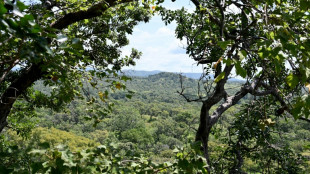 Endangered across west Africa, leopards thrive in I.Coast reserve
Endangered across west Africa, leopards thrive in I.Coast reserve
-
Risky gold rush drives young into Ivory Coast nature park
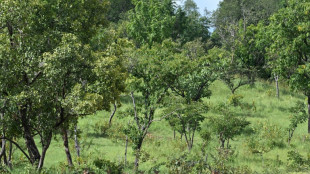
-
 Deadly roads block mothers from care in jihadist-hit Nigeria
Deadly roads block mothers from care in jihadist-hit Nigeria
-
Pillaged I.Coast nature reserve on the mend after crisis decade
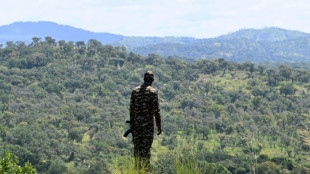

Invasive ants hit Texas hard - now a killer fungus is coming for them
When crazy ants roll into new parts of Texas, the invasive species wipe out local insects and lizards, drive away birds, and even blind baby rabbits by spewing acid in their eyes.
Scientists at the University of Texas at Austin now have good news: a naturally occurring fungus-like pathogen can be used to reverse their rampant spread across the southeastern United States, where they have wrought havoc for the past 20 years.
The findings were described Monday in the Proceedings of the National Academy of Sciences.
Ecologist and lead author Edward LeBrun told AFP that the fungus had already driven pockets of the invaders to extinction, and would soon be tested at environmentally-sensitive sites to protect endangered species.
Like fire ants, whom they have displaced in parts of Texas, tawny crazy ants are native to Argentina and Brazil and came to the United States via ships.
They are called "crazy" because of their erratic, jarring movements -- unlike the orderly marches of their cousin species.
While they don't have the venomous bite of fire ants, they secrete formic acid that shields them against fire ant venom, and incapacitates native animals.
"It's kind of a horror show," said LeBrun, who described apocalyptic rivers of ants swarming trees at an infestation site he visited at the Estero Llano Grande State Park, which had lost native ants, insects, scorpions, snakes, lizards and birds to the invaders.
Not only are they destroying ecosystems, "they're miserable to live with" for humans, said LeBrun. The ants seek out electrical systems to nest in, causing shorts in breaker boxes, AC units and sewage pumps.
Pesticides are highly toxic and serve only to slow their progress, leading to snowdrift piles of dead ants that have to be cleared, and the ants eventually break through anyway.
- Trojan ants -
About eight years ago, LeBrun and one of his co-authors Rob Plowes were studying crazy ants they had collected in Florida when they noticed some had unusually large abdomens swollen with fat.
When they looked inside their bodies, the scientists found fungal spores from a microsporidian -- a type of fungal pathogen -- and the species they found was entirely new to science.
Microsporidians commonly hijack an insect's fat cells, turning them into spore factories.
The pathogen's origins aren't clear -- perhaps it came from South America or perhaps from another insect.
Whatever the case, the team found it cropping up across Texas. They observed 15 populations for eight years, finding that every population harboring the pathogen declined, and 60 percent of the populations went completely extinct.
As an experiment, the team decided to place infected ants with uninfected ants at a nesting site inside a state park, placing hot dogs around the exit chambers of a box to entice the two groups to mingle.
The crazy ants form "supercolonies," which means separate groups don't fight each other for territory. This is a great advantage when swarming new areas, but it also turned out to be their biggest weakness, since it allowed the pathogen to spread unchecked.
The test was a huge success, driving the crazy ant population at the state park down to zero within a few years. Larvae that were tended by infected worker ants appeared particularly susceptible.
LeBrun explained this was good news in two ways: first, a pathogen of natural origin was selectively targeting the invasive species, limiting their ability to steamroll local ecosystems.
Second, scientists can accelerate the spread of the pathogen to kill the crazy ants quicker.
He cautioned, however, that the process was labor intensive, not something that could eradicate the species overnight.
The team will continue testing their new biocontrol approach at sensitive Texas habitats this spring.
L.Mason--AMWN
